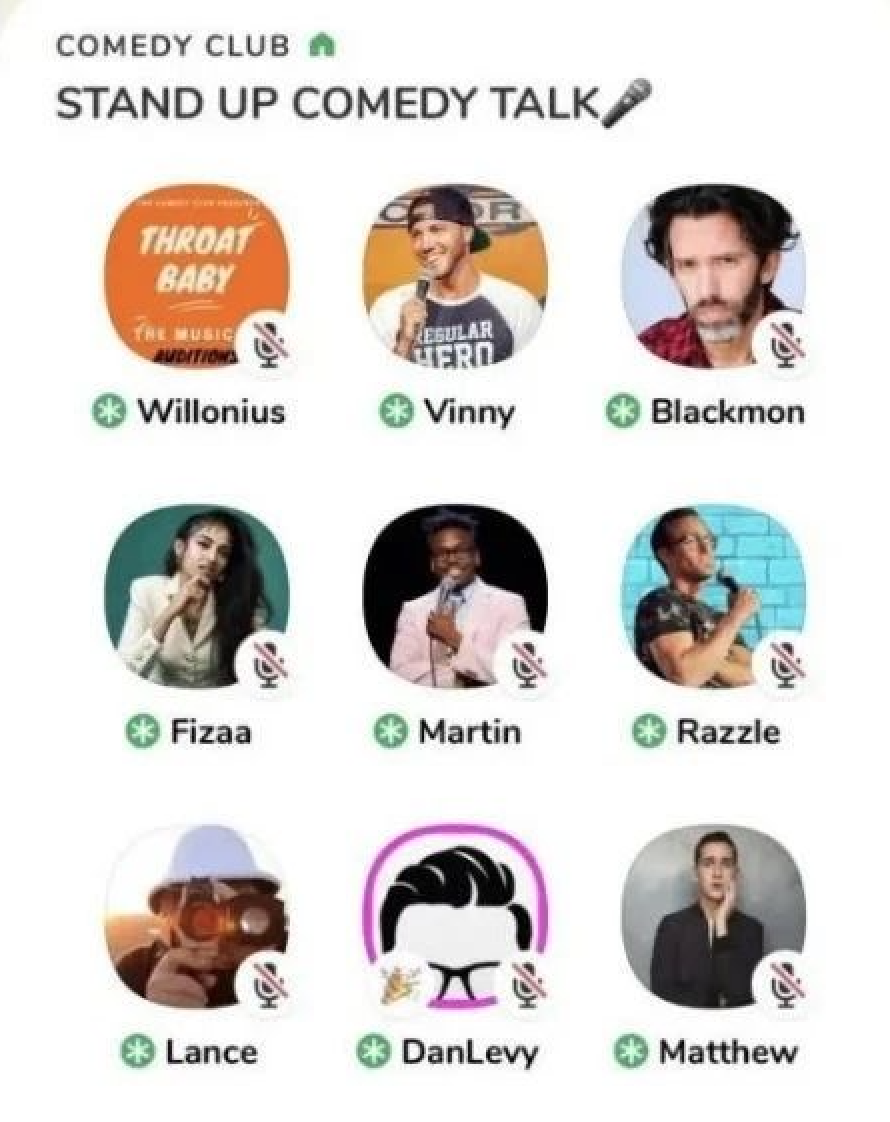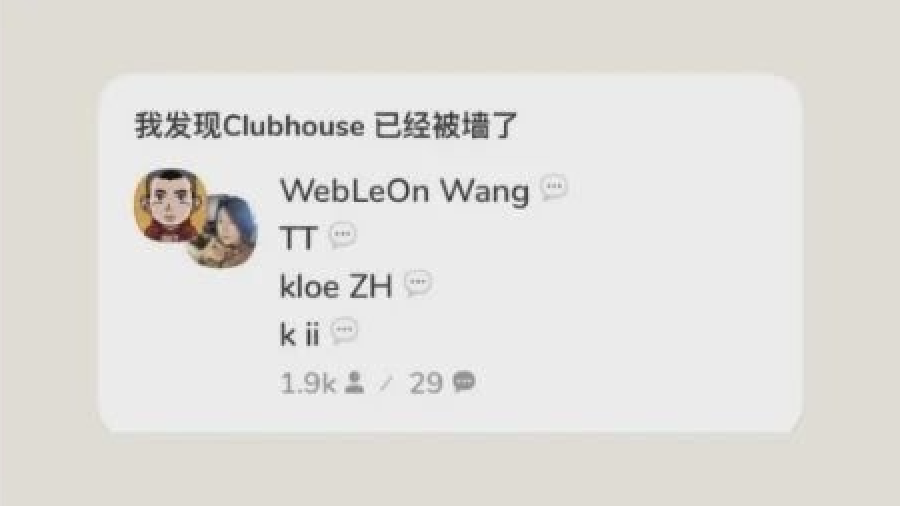Audio social-networking app Clubhouse has been banned in China since Monday evening. Much has been written in English language media about the explosion in popularity in China that preceded its ban, lamenting its faster-than-expected takedown, reflecting on the humanizing effects of the platform, and satirizing one notorious Chinese propagandist in the wake of the ban. Similar discussion has also been taking place within China, despite efforts to curtail it. CDT has translated the following analysis of factors underlying Clubhouse’s meteoric rise and fall, originally posted on WeChat but since deleted.
Why Did Clubhouse Have To Die?
Author: 子戈
Clubhouse has been banned. We all saw it coming.
But who would’ve thought that it would happen so quickly.
At seven o’clock last night, my friends and I were hanging out together and just happened to be talking about Clubhouse’s future. I didn’t want them to post something discouraging. Just then, we heard the news about the ban.
So fast? I promptly opened the app, and sure enough, the red words “unable to connect” raged at my eyes.
It only took a few days for Clubhouse to go from white-hot to stone-cold.
The speed of the state is plain to see.
Thinking back to the past, Google was on and off for four years before it was kicked out; Facebook’s blocking took five years; Twitter lasted three years; YouTube also had two years.
But this time, there were only a few days.
Looking at all the sorrow on the web, I can’t help but think back to everything that happened over the last few days.
Clubhouse’s popularity and decline actually stem from the same logic.
Behind this case, you can see the spirit of exclusivity inherent to modern China, and that formidable wall.
Take, for example, Elon Musk with his tweet on January 31, which caused the app to blow up; or the invitation system adopted by Clubhouse, which created a red-hot market for access. Clubhouse also drew big names from various fields, such as Kai-Fu Lee, Leung Man-tao, Ji Xiaohua… They shared their opinions for free, which people felt could not be missed.
Admittedly, these reasons are justified.
But I don’t think they’re the crux of the issue, which is also to say, they played a role in fanning the flames, but were not decisive factors.
So then what was the decisive factor?
In my opinion, there’s really only one reason why a piece of software becomes popular, which is that it satiates a kind of universal “hunger and thirst.”
The same is true for Clubhouse.
The reason why it captured so many Chinese users is not because of its functionality or technology, but because it created an atmosphere of discursive scarcity.
That atmosphere breaks down into three component parts: forum, audio, and dialogue.
Let’s talk first about “forum.”
If Clubhouse were to be defined, I would say: it is a public forum for free speech.
Entering it is like being in a public square filled with different groups of people. You can choose to stop walking and listen in. You can raise your hand to speak, and you can leave at any time.
The great appeal of this square is that it has no taboos, and you can speak freely; at the same time, it gathers people around their interests, allowing them to find belonging. Consequently, a group can be as small as a couple of film and TV workers complaining about their producers, or as large as compatriots on two sides of the Strait expressing their views on political issues. Here, they all have a platform.
“Cross-strait Youth Chatmogeddon—Free-for-all Q&A”—a room that previously attracted vigorous discussion
Secondly, audio.
You may think that the concept of a “Speakers’ Square” isn’t particularly new. Don’t platforms like BBS achieve the same thing?
Yes, but the special thing about Clubhouse is this: it doesn’t support text, pictures, or emojis, but only “sound” as a means of expression.
From the perspective of the product designer, it adheres to the principle of “less is more.”
On the other hand, sound has an irreplaceable advantage, in that it’s a more humane way of expressing oneself, and can provoke greater empathy than written words.
Along the same line, words written on a page have a completely different effect than those spoken aloud. When “point 5 SongTi” is transformed into “undulating sound waves,” abstract symbols are brought to life.
For example, on Clubhouse, a Chinese girl studying in Moscow recounted her experience during the pandemic. Many of her peers were repatriated on charter flights sent by their respective countries. Only she was barred from returning to her home country, and had no choice but to remain there.
She did not say anything particularly radical, just calmly spoke of her loneliness. But from her words “even after consecutive days of no new cases,” you could feel her helplessness.
This is the value of audio.
When confronted with someone’s voice, we’re able to detect the clues hidden by words, such as a person’s nationality, regional differences, ethnicity, and sex …. We can identify the voice on the other side as a “person,” and this opens the possibility for empathy.
The final point is dialogue.
This is also the point I feel most strongly about, having listened to Clubhouse over the past few days. It creates a harmonious and rational atmosphere for dialogue.
They might be talking about feminist issues such as surrogacy or challenges in the workplace, or political issues such as Myanmar’s democratic struggles or Biden’s China policy, but in every case, they strictly abided by one rule, which is: whether you’re a celebrity or a regular person, you have to line up to join the stage, and every person gets two minutes to express their opinion. During that time, you can’t criticize others, and you won’t be interrupted.
This rule gives everyone an equal opportunity to express themselves. Moreover, and more importantly, it reminds us: rather than sounding off, quietly listening is a prerequisite for understanding.
There’s a crossed out microphone in the lower right hand corner of every speaker’s avatar.
In this sense, the underlying cause for Clubhouse’s popularity is not technological innovation, the celebrity effect, or even the presence of taboo topics, but rather that it gives us a space to speak freely, such that every participant feels equal respect, and that after listening to a diversity of views, we can look forward to achieving consensus.
As to how long Clubhouse can last, it’s hard to say, but at least in these eight short days, it let people glimpse a little bit of that long-lost light.
But light is a scary thing.
Especially when the light has a glow of rationality and freedom, it’s even more disturbing.
Because in the eyes of the relevant department, rationality means the beginning of reflection, and freedom and loss of control are synonymous. These facts both carry enormous potential energy, posing a grave threat to stability.
If this were just a movie, we’d only need to get the scissors and cut out that dazzling light.
But we aren’t helpless against a light that we can’t cut out, because we still have a towering wall to block it all out.
This discussion room appeared after Clubhouse was blocked.
In this way Clubhouse has become a landscape beyond the wall. Even then, we don’t need to be too pessimistic, because it won’t be long because someone will develop a Chinese version of Clubhouse.
If you don’t believe me, look at previous websites that have been blocked: Google, Twitter, YouTube, Quora… which one doesn’t have a Chinese version now?
Not to mention, the real-time audio technology used by Clubhouse was originally introduced by a Chinese company.
Clubhouse audio technology comes from Chinese company Agora
Everything is already in place. The only “East Wind” that it still awaits is for the relevant departments to fine tune the corresponding supervision technology so that it can monitor audio for sensitive words in real time. This will happen in due course.
Until then, does this castrated version of Clubhouse have any meaning? Can the voices that we expect to speak freely and rationally still come out?
Perhaps, but it’s difficult for sure.
But one thing is for certain, it still has a ton of commercial value.
Because millions of webcasters are already sharpening their knives, ready to rush into the next opening to ply their wares. [Chinese]
Translation by John Chan.














